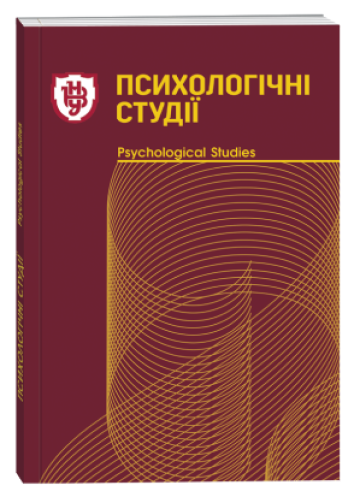FORMATION OF EMOTIONAL RESISTANCE OF FUTURE TEACHERS TO WORK WITH STUDENTS WITH PEOPLE
DOI:
https://doi.org/10.32782/psych.studies/2023.3.4Keywords:
future teachers, emotional stability, students with special educational needs, coping behavior, empathic abilitiesAbstract
The article is devoted to the study of the problem of the formation of emotional stability, as an important personal and professional attribute of future teachers to work with students with special educational needs. The purpose of the article is a theoretical and empirical study of the psychological features of the emotional stability of the personality of future teachers – graduates of the Uman State Pedagogical University named after Pavel Tychyna. In the course of a theoretical study of the problem of emotional stability of future teachers to work with students of OOP, the main components of emotional stability were highlighted (self-awareness, emotional intelligence, stress resistance, ability to emotional regulation, self-support, empathy. The key principles and approaches in the organization of an inclusive educational environment were characterized (inclusion, individualization, differentiated approach, cooperation with parents, adaptation of the physical and psychological environment, promotion of social adaptation, support of the psychological state of students with special educational needs), "Five-factor personality questionnaire" (adapted by A. Khromov), "Coping behavior in stressful situations" (S. Norman, D. Endler, D. James, M. Parker adapted version of T.A. Kryukova), it was established that the emotional stability of students of higher education is at an average level of development. Among the components of emotional stability, the components of emotional responsiveness and empathic perception, the rational channel and the intuitive channel are identified as the most developed, which are professionally significant qualities for working with students with special needs. Among the components of emotional stability, the most developed are self-control, emotional stability and commitment. It has been established that achievers exhibit "solution-oriented" coping behavior.
References
Аршава І. Ф. Емоційна стійкість людини та її діагностика : дис. ... канд. психол. наук : 19.00.02. Дніпропетровськ, 2007. 406 с.
Демченко І. І. Теоретичні і методичні засади підготовки майбутнього учителя початкових класів до професійної діяльності в умовах інклюзивної освіти : автореф. дис. ... д-ра пед. наук : 13.00.04, 13.00.03. Умань, 2016. 44 с.
Пилипенко К.В. Емоційна стійкість як професійно важлива якість майбутнього педагога. Актуальні проблеми психології в закладах освіти : збірник наукових праць. 2019. Випуск 9. С. 154–159. URL: https://journal.kdpu.edu.ua/psychology/article/view/3723 (дата звернення: 01.07.2023).
Пилипенко К.В. Формування емоційної стійкості як професійно важливої якості майбутнього практичного психолога : автореф. дис. … канд. психол. наук : 19.00.07. Київ, 2010. 23 с.
Пухно С. В., Щербак Т. І. Емоційна стійкість як складова емоційно-етичної компетентності майбутніх вчителів. Актуальні питання природничо-математичної освіти : збірник наук. праць. 2022. Випуск 2(20). С. 136–143. URL: https://library.sspu.edu.ua/wp-content/uploads/2023/02/aktualni-pytannya-pryr.-mat.osvity_220_2022.pdf (дата звернення: 06.07.2023).
Шульженко О. Є., Шульженко Д. І. Теоретична сутність взаємозв’язку емоційного інтелекту і емоційної стійкості майбутніх фахівців спеціальної та інклюзивної освіти. Корекційна педагогіка та спеціальна психологія : збірник наукових праць. Київ : НПУ ім. М. П. Драгоманова, 2019. № 37. Сер. 19. С. 141–147.
Шульженко О. Є. Дослідження емоційного благополуччя в контексті формування емоційної стійкості фахівця для корекційної роботи з аутичними дітьми особистості. Актуальні питання корекційної освіти : збірник наукових праць. Кам’янець-Подільський : ПП Медобори-2006, 2017. Вип. 10. С. 401–413.







